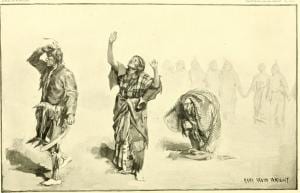
Epistemologically, it is difficult for us to prove we know what happens outside of ourselves. It is, likewise, challenging, if not impossible, to prove that there is really something “outside ourselves.” If we do not want to be bogged down with such a foundational concern, we must rely upon what we perceive through our senses and infer from our mind. That is, we must accept some things on faith. Only by giving up total skepticism, which itself is self-defeating, can we begin to explore reality. We have to trust our senses. We have to trust various rules of logic which we establish as basic principles for reasoning. Only by such trust, by such faith, do we transcend skepticism and open ourselves to that which we seek, the truth.
Obviously, we might give various reasons to indicate what we think justifies our faith. But when reason itself is in question, we can’t use that reason to justify itself. This is not to say the justifications we give are not helpful or useful. By contemplating upon what we believe, we can begin to understand it more and in greater depth. Thus, as we begin to apply our thoughts and beliefs to further examination and reason, we will slowly develop new, more sophisticated thoughts and beliefs. Reason can’t prove itself, but once it is accepted, it can take what is given to it and present new conclusions for us to believe and accept.
When interpreting the world at large, one of the intellectual tools we use to understand what we encounter is analogy. When interacting with other people, with other humans, our senses tell us that they are like us, that they hold something in common with us over and against other objects which we sense. We believe that this commonality allows us to interpret their experiences and relate them to ours. If they say they are happy, sad, mad, or disgusted, we believe that they mean the same thing (or at least a very similar thing) with those words as we do when we use them. If we see them smile, we likewise interpret their smile according to various ways we smile, and so, through analogy, come to a conclusion what their smile means. If we see someone appears to be wounded, such as having cut on their forearm, we use our own experiences to understand what they are experiencing, so that even if we have not ever had such a wound, through abstraction and analogy, we come to various conclusions as to what we think they must be experiencing.
Analogy also allows us to interpret reality as a whole. We will use analogy differently depending upon what is being interpreted. Those things which perceive to be more similar to each other, we will interpret with a sense of greater commonality than those things which we think are not so closely related. The process, of course, is fallible. We can get things wrong. If, for example, we try to understand what a particular animal might be experiencing, we can and should use analogy as a means of making such a determination. We might, of course, come to a wrong conclusion, especially if we have not sufficient data to render a conclusion possible, but even with limited knowledge we can make general estimations which can later be refined.
If we see a dog with a broken bone, we use analogy to interpret what the dog is experiencing. If we see a dog which has not eaten for days, we use our own understanding of hunger to interpret what that must feel like to the dog.
While acknowledging the limitations of analogies, we must recognize its strengths. We extrapolate and universalize what is true based upon what we already know to be true. We know ourselves better than what lies outside ourselves. Once we accept that there is something outside of ourselves, and the phenomena our senses relate to us are generally true, we can begin to interpret the world and the objects in the world according to what we have learned about ourselves.
The importance of this basic fact can be seen in the way scientists explore the world around them. Every step of the way, some skeptical response can be raised which the sciences cannot answer. The sciences must rely upon some basic principles on faith, including but not limited to, the assumption that our senses actually give us sensory data about the world at large. Likewise, we must assume that biological creatures with many apparent physical features in common will share experiences in common. We could be wrong. The skeptics are right. But then again, how do we know there are skeptics out there to be right about this if we don’t take on faith that what we sense is real?
Good scientists already know the limitations of their enterprise. They know they can’t refute pure skepticism. They might realize that it is better to rely upon some element of faith than pure reason (especially since reason can’t be used to affirm the validity of reason itself), but of course, they will try to limit the amount of pure faith they need in their determination of reality. The more data they have, the more they must interpret, but also the more they can justify their conclusions. For example, when dealing with ethology, the science of animal behavior, scientists must be accept some things on faith, including but not limited to, the ability to analogize their own experiences with the animals they are researching. Marc Bekoff, talking about this problem, pointed out that we can learn much about animals, but this is only if we accept “reasonable intuitions” as a way to interpret our observations
Some skeptics say that we can never know what another human, much less a member of another species, really is thinking or feeling, because she or he either could be lying to us or cannot tell us because of not having a “language.” However, by using careful observations and some reasonable intuitions we can learn a lot about our kin. Not only can we learn about their behavior and what they think about, but we can also gather practical information concerning how humans influence other animals’ lives when we intrude on them. We can also learn how we can make the lives of animals the best possible when they are held in captivity.[1]
From this, he says, we can conclude many things about animals, including their emotional lives, when we observe them. Their actions and responses to stimuli tell us much about them, including they are conscious, at least to some extent, of their surroundings and they have intellectual and emotional responses to what happens to them:
It is obvious that many animals are awake and aware of their surroundings and that they respond to changes in social and nonsocial stimuli with which they are confronted simultaneously and sequentially. May animals also have “as if” they have a sense of self, but we do not really know this. What we do know is that many animals clearly behave in a manner that shows that they have some sense of their own bodies and that they behave as if their bodies are not the bodies of others. Whether body-awareness also indicates self-awareness for some species – that individuals who know who they are – remains a mystery. Perhaps we are looking for self in all the wrong places or faces.[2]
Our engagement with others comes from the way we interpret and understand them, especially in relation to their actions. We know this is true with other humans. But, it is clearly true with every other living being we encounter. What someone does tells us much about them. Of course, we must recognize that such a way of interpreting and getting to know others is limited. Even what they openly tell us about themselves through conversation gives us a limited representation of who they are. There is much which is hidden from us, much which will remain hidden from us, because we are not them.
This, however, is true, not just about other humans, not just about other creatures in the world, but also about God. St. Bonaventure, St. Thomas Aquinas, St. Gregory Palamas and others agree, God transcends us in such a way we will never comprehend him, but we also come to know about him through his actions and what he purposefully reveals of himself to us (which is itself a specific kind of action). This is what St. Gregory Palamas meant when he talked about coming to know God through his energies, that is, through his eternal activities: God transcends what we know about him, but through his actions (such as in the act of creation) we know something about him and so come to know him:
The energy is not known from the essence; but we do know from the energy that the essence exists, though we do not know what it is. Thus according to the theologians God’s existence is known from His providence, not from His essence. Such, then, is the way in which energy can be distinguished from essence: the energy is that which makes known, while the essence is that whose existence is made known by the energy.[3]
This is what made St. Gregory Palamas concerned about the distinction between God’s incomprehensible essence and his energies. We come to know God through his actions, which for God is really one eternal and simple act, but experienced by us in various ways, and therefore, various energies (or actions) which we use to predicate many names to God:
God’s essence is entirely unnameable since it is also completely incomprehensible. Therefore we name it on the basis of all its energies, although with respect to the essence itself none of those names means anything different from any other. For by each name and by all names together nothing other is named except that which is hidden and whose real identity is unknown to all.[4]
St. Thomas Aquinas made a similar argument about God. Pointing out that effects tell us something about their causes, creation, an effect of God and his creative activity, should tell us something about God:
Effects that fall short of their causes do not agree with them in name and nature. Yet, some likeness must be found between them, since it belongs to the nature of action that an agent produce its like, since each thing acts according as it is in act. The form of an effect, therefore, is certainly found in some measure in a transcending cause, but according to another mode and another way. For this reason the cause is called an equivocal cause. Thus, the sun causes heat among these sublunary bodies by acting according as it is in act. Hence, the heat generated by the sun must bear some likeness to the active power of the sun, through which heat is caused in this sublunary world; and because of this heat the sun is said to be hot, even though not in one and the same way. [5]
Peter Lombard, similarly, explained how we obtain many truths about God:
God’s truth, then, could be known in these several ways. God is a single and simple essence which does not consist in any diversity of parts or accidents. But the Apostle says in the plural, the invisible things of God, because God’s truth is known in several ways through the things which are made. Indeed, from the perpetuity of creatures, the Creator is understood to be eternal; from the greatness of creatures, all-powerful; from their order and disposition, wise; from his governance over them, good. And all these things pertain to showing the unity of the Godhead.[6]
Taking what Lombard said, we can see how Aquinas could assert that we come to know God through creation; what is important is that we do so through the use of analogy:
From what we have said, therefore, it remains that the names said of God and creatures are predicated neither univocally nor equivocally but analogically, that is, according to an order or reference to something one. [7]
Skeptics might question all kinds of things we say about God as a result of our experience with God. Their questions will resemble the questions skeptics give to scientists. If we are pure skeptics, we will never be able to come to any claims about the truth. But if we get beyond pure skepticism and engage, on faith, what lies beyond us, then we can see there is a similarity between the way empirical sciences learn about the world at large and the way believers learn about God. The way Marc Bekoff suggests we should interpret and come to understand animals is exactly how we come to understand God.
We must decide for ourselves how much we will take on faith, including and especially the faith we have in our own observations and interpreting those observations. The fact that there exists something rather than nothing, that there is a universe which exists, suggests there is some foundation for that universe, and that foundation is God. What exists serves as a revelation to us, the primary or first revelation for many of us, that God exists. He is first revealed to us as creator, as the cause for existence itself. Oce we accept this, then we know creation itself is a manifestation of God and so in and through our examination of creation, we can come to know something about God.
This, then, brings us back to where we began. Whether or not it is some fellow human, some animal, or God, we must accept on faith what a particular other reveals to us about themselves. We must do this with the recognition that whatever is revealed is limited in comparison to the subject in question. Ethologists, trying to interpret animal behavior, as well as their inner life, their emotions and thoughts, realize the limits of their enterprise. This does not stop them, because after all kinds of qualifications have been made, they can show us much about the animals they have observed, explaining how and why they were able to make their conclusions. Likewise, then, we come to know God through what he reveals of himself us by what he does, accepting whatever qualifications are necessary before coming to conclusions about who God is and what he is like.
Faith and reason must go together if we are going to transcend skepticism. Each gives us a kind of assurance the other cannot. Without faith, we cannot even prove what reason suggests to be true is true. But without reason, we likewise will find ourselves capable of holding to various opinions which are demonstrably false. The two together help refine each other and lift us up beyond the impasse of skepticism so we can ascertain some element of the truth itself. Once we accept that we can rely upon reason and experience and our intuitions, then we can accept the other, be it human, animal or God, and accept the limited revelation we have of it as showing us some truth about it which we do not need to deny. We can accept animals have emotions through analogy. Likewise, through analogy, we can come to realize the greatness of God. But if we are to deny the value of analogy, we will end up incapable of moving beyond ourselves and forever stuck in the skepticism of the closed-self. And this means, we won’t be able to prove that there is an author to this text.
[1] Marc Bekoff, Minding Animals: Awareness, Emotions, and Heart (Oxford: Oxford University Press, 2002), 92.
[2] Marc Bekoff, Minding Animals: Awareness, Emotions, and Heart, 97-98.
[3] St. Gregory Palamas, “Topics of Natural and Theological Science and on the Moral and Ascetic Life: One Hundred and Fifty Texts,” in The Philokalia: Volume IV. Trans. and ed. G.E. H. Palmer, Philip Sherrard, Kallistos Ware, et. al. (London: Faber and Faber, 1995), 412 [#141)
[4] St. Gregory Palamas, “Topics of Natural and Theological Science,” 413 [#144].
[5] St. Thomas Aquinas, Summa Contra Gentiles. Book One: God. Trans. Anton C. Pegis (Notre Dame: University of Notre Dame Press, 1975), 138 [Chap. 29].
[6] Peter Lombard, The Sentences. Book I: The Mystery of the Trinity. Trans. Giulio Silano (Toronto: Pontifical Institute of Medieval Studies, 2007), 20 [Book I, Dist. III Chap. 1].
[7] St. Thomas Aquinas, Summa Contra Gentiles. Book One, 147 [Chap. 34].
Stay in touch! Like A Little Bit of Nothing on Facebook.
If you liked what you read, please consider sharing it with your friends and family!













